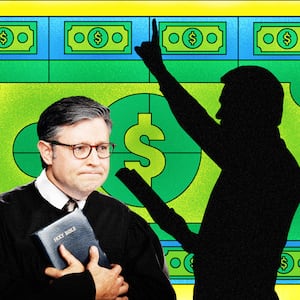If you want to know where Republican House Speaker Mike Johnson stands on any given political issue, he has a simple answer.
“Go pick up a Bible off your shelf and read it—that’s my worldview,” Johnson told Fox News host Sean Hannity in an interview shortly after winning the speaker’s gavel in October. “That’s what I believe, and so I make no apologies for it.”
While Johnson’s folksy answer dodges the question, you can find clarity elsewhere. And the more clarity you get, the more you understand why Johnson may be evasive.
A Daily Beast investigation of his affiliations, influences, and public statements shows that Johnson’s worldview was forged in a radical theological tradition—the leaders and adherents of which have disputed some of the country’s most important constitutional principles, including amendments that freed the slaves and extended basic rights to all citizens.
That may sound dramatic, but Johnson’s connections to one particular strain of Christian fundamentalism elicit legitimate questions about the speaker’s biblical and constitutional interpretations. Those questions are all the more pressing given how open leaders of this movement have been about using anti-democratic means to achieve their desired religious ends—and given Johnson’s own prominent role in the GOP effort to overturn the 2020 election.
While Johnson’s legal endeavors to keep Donald Trump in office have been well documented, so, too, have his ties to that fundamentalist strain, known loosely as Christian dominionism.
In a definitional sense, Christian dominionism is the belief that Christians should hold “dominion” over things like media, culture, and politics. In practice, it’s a radical theology—unifying a number of fundamentalist ideologies—advocating for biblical interpretations of law and society and hard-line views on issues like abortion and marriage.
More broadly, Christian dominionism seeks to establish the United States as a Christian nation governed by biblical law. And several leaders in the dominionist movement have had a profound impact on Johnson personally—by Johnson’s own admission.
In December 2021, for instance, Johnson publicly praised David Barton, a Christian nationalist whose historical studies have been rejected as wildly inaccurate. The Southern Poverty Law Center’s entry on Barton notes that he has repeatedly “demonized LGBTQ persons and communities, arguing that HIV and AIDS are god-given consequences for living out one’s LGBTQ life.”
And yet, Johnson said just two years ago that Barton has had “a profound influence on me, and my work, and my life, and everything I do.”
Those comments came at a national gathering of Christian lawmakers in North Texas, where Johnson said he was first introduced to Barton and his ministry “a quarter-century ago.”
Barton has stayed in touch with Johnson since the Louisiana Republican took the speakership in October. Barton disclosed on a podcast recently that he and his group had been advising the new speaker on who to hire in the speaker’s office. “We’ve already been talking with him about staff, and what kind of staff,” Barton said. “They need to be the people with his worldview.”
“He is not going to compromise who he is,” Barton added.
Barton’s group, WallBuilders, advocates for laws and legal interpretations premised on a fundamentalist interpretation of the Bible. And Barton’s website once published an in-depth defense of biblical slavery, challenging aspects of the 13th Amendment. The essay was first posted in 2003 and, though widely criticized, was only taken down at some point after October 2022, according to the nonprofit Internet Archive.
More recently, Barton said on the WallBuilders podcast that Johnson’s elevation to the speakership offers him and his group “some tools at our disposal” that “we haven’t had in a long time.”
Johnson has been open about his belief that the United States should be a Christian nation living under rules set by the Bible. In a 2016 interview, Johnson noted the seemingly peculiar distinction that the United States was not founded as a direct democracy, but as a constitutional republic. That republic, he said, was designed according to “biblical admonition” about what a “civil society should look like.” He has also argued fervently for a “biblically sanctioned government,” insisted the United States is a “Christian nation,” conflated his attorney’s practice with a “legal ministry,” and dismissed the “so-called ‘separation of church and state’” in a speech, fittingly, on the House floor.
In 2016, Johnson sat down with the Louisiana Baptist Message as he was running for Congress. During that interview, he expressed a number of thoughts closely associated with Christian dominionism.
“I was called to a legal ministry, and I’ve been out on the front lines of the culture war defending religious freedom, the sanctity of human life, and biblical values,” Johnson said, specifically mentioning “traditional marriage” and “other ideals.”
Just last month, Johnson also gave the keynote at a dominionist conference, during which he claimed that his elevation to House Speaker was an act of God, who had told him personally to prepare for a “Red Sea moment.”
The Daily Beast requested comment from Johnson’s office about the speaker’s ties to far-right Christian leaders and traditions. The comment request specifically asked whether Johnson thought biblically sanctioned violence conflicted with his duties as an officer of the constitution, whether he denounced the teachings of hardline fundamentalists who have endorsed biblical slavery and rejected constitutional provisions like liberty and justice, and whether he personally believed the Bible permitted slavery.
A spokesperson for the speaker provided a statement that didn’t answer any of those questions.
“None of these actions or comments you are referencing were made by Speaker Johnson. The Speaker is not going to apologize to the Daily Beast for his Christian faith or judge the beliefs or statements of others,” the statement said.
But religion experts interviewed for this article said Johnson’s affiliations are central to understanding his own convictions.
Keri Ladner, a religious studies scholar and author, told The Daily Beast that Johnson is “too smart” to outwardly avow any connections to widely denounced veins of extremism, even though the evidence is all around him. (The spokesperson’s statement added a twist, however, also refusing to disavow those connections.)
Johnson, Ladner said, would not publicly promote the kind of radical theologies that have become anathema to more mainstream dominionism, but his associations, statements, and friendships over decades reveal significant and undeniable commonalities.
“When you dig into the people around Johnson, that’s what you find when you peel back the layers—it’s absolutely in that orbit,” she said.

Speaker of the House Mike Johnson (R-LA) (center) walks through the Capitol Rotunda with Senators Ron Johnson (R-WI), left, and Rick Scott (R-FL).
Jack Gruber/USA TODAYJames Aho, author and professor emeritus of religious studies at Idaho State University, particularly flagged Johnson’s adulation for Barton as a significant marker of his ties to the dominionist movement.
“That is huge,” Aho said, noting what he described as Barton’s “apology for slavery.”
“It’s alarming that these people have gotten into Congress,” he said.
Johnson’s orbit is certainly full of radical theologies, and he has shown little reservation about lending his voice to their organizations and efforts.
In 2019, Johnson delivered a keynote speech to the Council for National Policy, an elite and secretive pro-Christian group that wields immense influence in conservative politics. That group was co-founded by Gary North, an influential Christian dominionist who has endorsed biblical slavery. North died in 2022, but the group’s 2014 membership registry also listed North’s father-in-law, Rousha Rushdoony, in the “in memoriam” section—an acknowledgment of the impact of Rushdoony’s ideas on the group.
Rushdoony, for those less familiar with extremist Christian theology, is credited as the godfather of “Christian Reconstructionism,” another offshoot in the far-right evangelical tree. Rushdoony advocated for Old Testament laws to be applied to modern society, therefore supporting the death penalty for biblical “crimes” like homosexuality, adultery, and public blasphemy—among many other violations.
During that CNP keynote speech, Johnson delivered a succinct summation of his participation in the Christian fundamentalist movement.
“I grew up in the movement,” Johnson said, going on to fawn over Tony Perkins, who has fiercely pushed Christian nationalism as the head of Family Research Council, and Mat Staver, who has advocated for laws criminalizing same-sex relationships.
Specifically, Johnson noted that he had apprenticeships under Staver and Perkins, both of whom he cited by name. Twice, he said he was their “bag boy.”
Perkins—whom Johnson has also described as a “big brother”—is particularly enmeshed in Johnson’s political and spiritual life.
In 1998, out of “concern about the influence of the homosexual movement,” Perkins created the Louisiana Family Forum—the anti-LGBTQ, anti-abortion group that launched while Johnson was in law school. The LFF eventually served as an incubator for Johnson’s activism. And Perkins claims to have worked “hand in hand” on anti-LGBTQ issues with Johnson’s longtime legal employer, Alliance Defending Freedom, the extremist legal advocacy organization which Johnson joined shortly after graduating.
The two men became close. In fact, days after Johnson took the speakership, Perkins sat down with The Christian Post to detail his 25-year relationship with Johnson. The two are so close, he said, that Perkins actually played a role in Johnson deciding to run for the speakership.
“There was a need for leadership, and Mike and I had been talking about that and just praying through it and felt like the opportunity was going to come where a leader like him could step forward, and that did, in fact, occur,” Perkins told The Christian Post.
(Perkins once paid former KKK Grand Wizard David Duke $82,500 for his mailing list while managing a Louisiana congressional campaign, and the Federal Election Commission fined the campaign $3,000 for attempting to cover it up. Duke, meanwhile, has also been described as having an “off and on relationship with the Dominionist community.”)
In January, House Democrats in the Congressional Freethought Caucus published a white paper outlining many of Johnson’s longstanding ties to Christian nationalism and leaders of the New Apostolic Reformation (NAR)—yet another radical strain of Christianity with direct ties to dominionism.
NAR advocates for the “Seven Mountain Mandate,” which puts forth the idea that there are seven aspects of society that Christians need to take over and dominate: family, religion, education, media, entertainment, business, and government.
One of the leaders of that movement is pastor Jim Garlow. Garlow is perhaps better known for propagating lies about Donald Trump’s 2020 defeat. He was a key figure in the “Global Prayer for Election Integrity” calls, where Christians were asked “to pray and mobilize for Trump’s reinstatement as President.”
But Johnson has been closely associated with Garlow.
“You’ve been a profound influence on my life and my walk with Christ, brother,” Johnson told Garlow during one World Prayer Network call from November 2021, once again using the same phrase he applied to Barton.
Garlow, for his part, has said Johnson “ranks up there in the top 1 percentile” in Congress and has “worked with us very closely.”
Johnson, of course, is an election denier who promoted dubious legal theories in the wake of Trump’s defeat. He literally led the effort in Congress to use the courts to overturn the 2020 election. But Johnson’s close association with Garlow is yet another indication of his ties to dominionism—and has been the impetus for a number of ominous quotes.
Johnson’s frequent appearances on Garlow’s World Prayer Network, as Rolling Stone reported in November, have prompted Johnson to say things like:
- “The only question is: Is God going to allow our nation to enter a time of judgment for our collective sins?”
- “The culture is so dark and depraved that it almost seems irredeemable.”
- “We are a nation subservient to Him.”
While studying law at Louisiana State University, Johnson cut his teeth in conservative Christian politics by volunteering at LFF. The LFF first launched during Johnson’s time at LSU, when it was helmed by Christian dominionists like Gene Mills, an influential Pentecostal minister, and Perkins. In 2005, the LFF gave Johnson its annual “Gladiator Award,” and Johnson has been described as “one of Mills’ closest allies.”
As a lawyer, Johnson worked for years at the Alliance Defending Freedom, a Christian legal organization with ties to dominionists. While ADF presents itself as a conservative response to the American Civil Liberties Union, it does not take clients regardless of ideology, as the ACLU famously does. Instead, ADF has pursued a dominionist-minded mission: to enshrine fundamentalist Christian biblical interpretations into law. Johnson himself pursued that goal while at the organization for a decade.
Religious experts all noted the degree of certainty with which Johnson and his fundamentalist peers have interpreted the Bible. They said that rigid interpretation was particularly troubling for officials entrusted with such power over law and policy.
Adam Perez, professor of religious studies at Belmont University, told The Daily Beast that this interpretational architecture is, by its nature, authoritarian.
“They read the Constitution the same way they read the Bible, the same biblical literalism,” Perez said. “It’s an ahistorical critique, and what that allows for is to say, ‘Our reading of scripture and the Constitution is right, because functionally we are authorized to be the people who interpret it for you.’”
“They say they’re reading it plain and literally,” Perez continued, “and that allows them to strip away nuance, close the circle of interpretation small enough that it feels totalizing and the interpreter has all authority.”
Julie Ingersoll, author and scholar in Christian fundamentalism at the University of North Florida, noted that these kinds of extreme, hardline worldviews—many of which inform and sometimes dovetail with political violence—tell you more about the believer themselves than they tell you about what they believe.
“This experience just gets absorbed into the universe, this version of god that people imagined,” Ingersoll said. “What I think of god tells you what I think god would be like, and that actually says more about me.”
Theologians and experts in Christian fundamentalism told The Daily Beast that, while Johnson’s dominionist streak is a mile long, that catch-all alone still doesn’t capture his specific worldview. Instead, they said, look at Johnson’s influences and associations, what he has said, and, importantly, what he does not say.
In that view, Johnson hails from a long line of Christian nationalists, some of whom have propounded beliefs so controversial that they’ve been excised from public-facing rhetoric, even though followers have a worldview that’s as extreme as ever.
Ladner suggested Johnson was similar with regard to those public and private distinctions.
“Dominionist politicians aren’t going to come out and identify themselves and say, ‘We want to take over the government,’” Ladner said, citing the movement’s comparatively recent distancing from extremist leaders like Rushdoony and North.
Ingersoll singled out Rushdoony and North as two figures who could shed light on Johnson’s beliefs. Ingersoll drew a direct line from the Christian Reconstructionist influence to religious violence, such as attacks on abortion clinics. (Johnson previously gave legal representation, for free, to a number of clients tied to violent religious extremism.)
“And now we’re having this big argument once again about gay rights,” Ingersoll said.
Rushdoony and North have also made arguments justifying, even endorsing, biblical slavery. After Johnson seized the House gavel in October, journalist and longtime Christian nationalist researcher Bruce Wilson said Johnson’s proximity to Barton suggests his ideology might be closer to Rushdoony and North’s Christian Reconstructionism than is publicly known, specifically highlighting that movement’s defense of biblical slavery.
Aho, the Idaho State University religious scholar, explained how seemingly morally indefensible positions, like punishing gay people, derive from hermeneutics—the study of biblical interpretations.
“In Christian dominionism, the principle is that, unless a particular Old Testament decree or ruling has been explicitly denounced, denied, or rejected by either Jesus Christ or one or more of the apostles—particularly St. Paul—then that Old Testament reading is also applicable in a reconstructed America taken back in the name of Christ. That’s theological legal principle they work from,” Aho said.
Slavery—as Rushdoony, North, and other modern dominionist leaders have argued—was never abolished by God in the Bible. At the same time, the text acknowledges and even condones forms of human bondage. (Leaders in the Southern states used these same biblical arguments to justify slavery.)
Aho pointed to an article he wrote, hosted by the Oxford Research Encyclopedia, which outlines how extreme dominionist ideologues reject not only the 13th Amendment, but several others, including the 14th, 15th, 19th, and 26th—even the Emancipation Proclamation. Dominionists are also anti-tax, with hardliners citing any rates higher than the Bible’s 10 percent tithing requirement as heretical.
Of course, most dominionists today find many of these arguments unsavory, at least publicly, and Rushdoony-style reconstructionism has largely fallen out of favor in public discourse. However, as the experts pointed out, that distancing is a relatively recent advancement, and this extremist genealogy appears again and again in Johnson’s life.
Johnson doesn’t exactly call himself a “Christian dominionist,” preferring to just go with the more relatable “Christian” or “Baptist.” But he’s been named as a dominionist before. A 2019 local news story in the Bayou Brief documented how notable dominionists—like Johnson—were attempting to turn Louisiana into a “theocracy.” Other outlets—like The Bulwark, NPR, and Rolling Stone—have also noted many of Johnson’s close associations with dominionist leaders.
Johnson has conspicuously avoided distancing himself from these labels.
According to Perez, the Belmont professor, these seemingly short memories about recent extreme beliefs are a result of an ongoing whitewashing and the soft touch with which many pastors deliver the dominionist message.
“Christians who ascribe to this thinking, it’s not presented to them as radical. Dominionism is presented to them as everyday,” Perez explained. Leaders like Johnson, he said, often take a “simple, gentle, folksy approach” that rebrands and obscures the more unseemly views at the roots of the movement.
The religion experts also emphasized the dangerous violent extremism that simmers within radical strains of faith.
The thread of justifiable authoritarian violence has long run through radical Christian subsets in the United States, from slavery to white supremacy to the assault on the U.S. Capitol.
Among the various banners seen in that boiling crowd of insurrectionists on Jan. 6 were several white flags emblazoned with a green pine tree—a Christian nationalist symbol known as the “Appeal to Heaven” flag.
Not long after Johnson moved into the Speaker’s office, that flag appeared outside his door.










